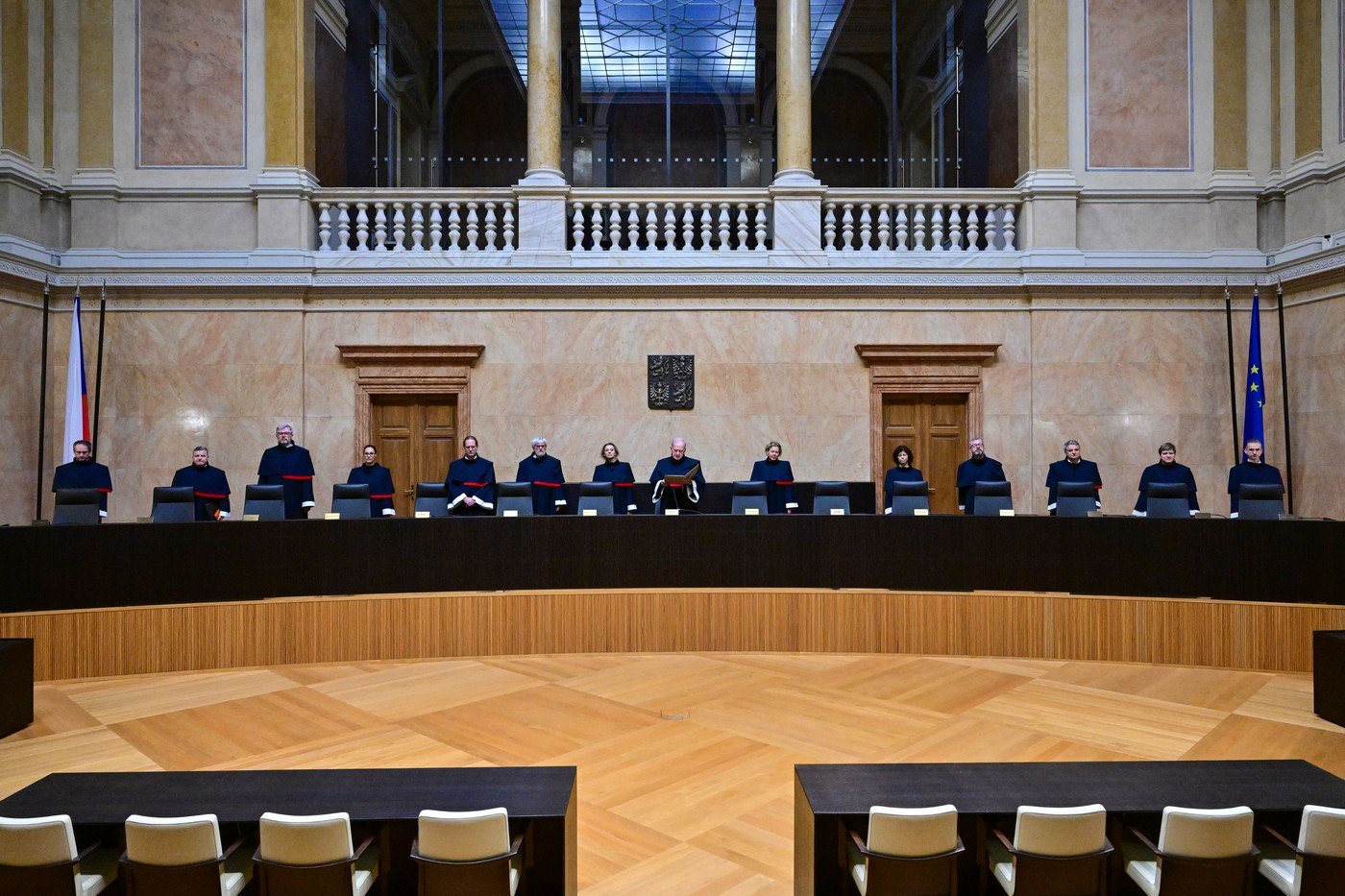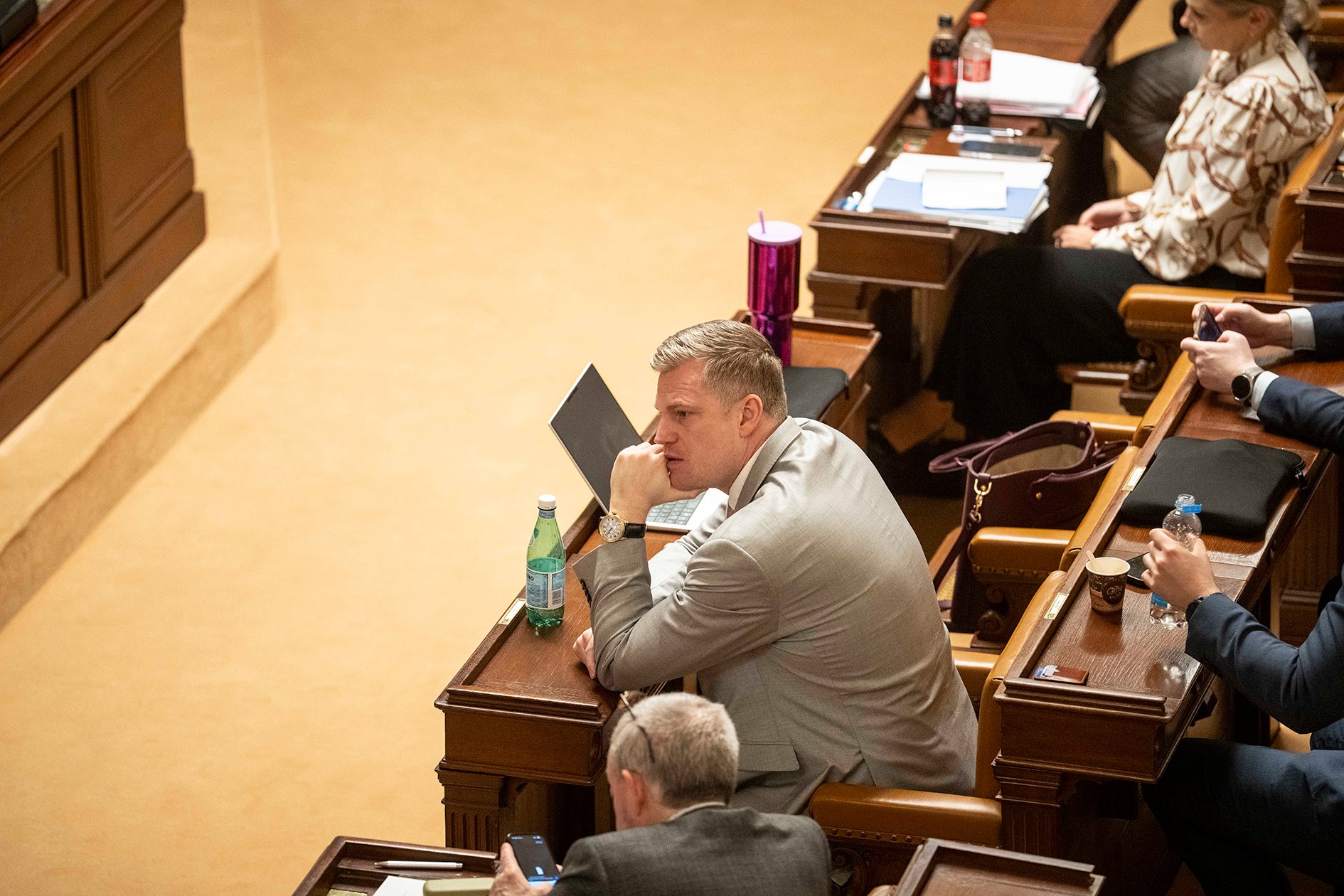EDITOR-IN-CHIEF'S LETTER TO THE PUBLIC PROTECTOR OF RIGHTS
I contact you as the Public Protector of Rights to suggest that you consider and possibly initiate a change in the Criminal Code or an amendment to the Criminal Code within the procedure defined in Part III of the Public Protector of Rights Act.

Public Protector of Rights
JUDr. Otakar MOTEJL
Brno
Prague, dated 5 .4. 2002
Dear sir,


I contact you as the Public Protector of Rights to suggest that you consider and possibly initiate a change in the Criminal Code or an amendment to the Criminal Code within the procedure defined in Part III of the Public Protector of Rights Act.
As an introduction, I would like to acquaint you with a case, to which both the Czech and foreign mass media paid considerable attention and which is closely associated with my suggestion.
On 22. 10. 2001, the Respekt weekly magazine published an article titled "Something Mean and Vulgar" authored by me. One sentence in the article - "But his government (note: i.e. Zeman's government) has lost its struggle against corruption, as shown by the information from Transparency International and the corruption behaviour of the Ministers, ranging from Březina, the youngest one, to Grégr, the oldest one." -outraged the Czech government to the extent that the Prime Minister Ing. Miloš Zeman stated at a press conference held after a governmental meeting on the same day: "Please, allow me to inform you in conclusion that at its meeting today, the government has decided to file an action, or speaking precisely, a report on the commission of a crime against the Schwarzenberg-funded weekly magazine Respekt, whose chief editor, Mr. Petr Holub, today accused the government of corruption as a collective body, ranging from its youngest member, i.e. Karel Březina, to its oldest member, i.e. Miroslav Grégr. In addition to that, the government members will file separate complaints, in which they will claim adequate financial indemnification so that Respekt ceases to exist at last, and the adjudicated financial indemnification, if the court adjudicates it to the Ministers, will be dedicated by them exclusively and solely to humanitarian purposes." … "There are 17 members of the government. I hope that even the Czech journalists will come to understand that 17 times 10 is 170 million."
Even though none of the Ministers has filed a civil action against R-PRESSE s. r. o., the publisher of the Respekt weekly magazine, (probably for the reason that such a Minister would have to pay quite high legal expenses), a report on the commission of a crime was filed against me, based on the suspicion that I allegedly committed criminal libel as defined in the provision of Section 206 of the Criminal Code and the crime of assaulting a member on duty of a state body pursuant to the provision of Section 154 of the Criminal Code through the sentence quoted above. It was validly decided that the criminal case conducted against me would not be proceeded with.
I regard the public statement of the Prime Minister, in which he expressed that the purpose of filing actions for protection of the personal rights of an individual concerning individual Ministers, is to receive astronomical financial amount with the aim of removing one free periodical from the world of mass media, as an absolutely serious assault on the constitutionally guaranteed political rights: the freedom of expression and the right to information, which, in my opinion, is even more serious if such an assault is made by a statesman of our country, of whom one would absolutely rightfully expect, in every normally functioning democratic society, that he will, on the contrary, actively stand up for protection of political and any other rights. Even though censorship is inadmissible, this statement cannot be regarded otherwise than as some sort of non-institutional censorship, which sent a warning about open criticism of the government to all the Czech mass media and a signal to the Respekt weekly magazine that the magazine and the author of the article would be exemplarily punished for such criticism. On these grounds, I defended myself against the statement of Ing. M. Zeman by filing a report on the commission of a crime against him. Even though the Criminal Code does not formulate any body of a crime that would provide protection of the said political rights, I only expressed a suspicion in my report on the commission of a crime that with this statement, the Prime Minister had committed a crime of violence against a group of inhabitants and an individual pursuant to the provision of Section 196 of the Criminal Code and, taking into account this and a number of other seditious statements concerning the Czech journalists or individual periodicals, including the Respekt weekly magazine, I also expressed the suspicion of commission of a crime of incitement to hatred for a group of persons or to restriction on their rights and freedoms as defined in the provision of Section 198a of the Criminal Code. The fact, which I perceive most sensitively as a journalist, that is, the fact that Ing. Zeman assaulted the freedom of expression and the right to information, could only be pointed out on the basis of evaluation of the social dangerousness of his action due to the absence of protection of these rights by criminal legislation. Even in this criminal case, it was validly decided that it would not be proceeded with. The justification of this decision was that the Prime Minister's statements do not accomplish elements of a crime.
I am aware that the scope of the powers of the Public Protector of Rights does not cover the government or the bodies responsible for criminal proceedings, prosecuting attorney's office, etc. according to the provision of Section 1, paragraph 3) of the Act No. 349/1999 Coll. in its valid wording. This is why I do not contact you with an application for rectification concerning the statements of the Prime Minister, the steps taken by the government, which filed a report on the commission of a crime against me, or the decision of the bodies responsible for criminal proceedings, which decided not to proceed with the criminal case against Ing. M. Zeman.
This letter only appeals to you to consider proceeding according to Part III of the said Act and exercising your right to recommend the government amending the Criminal Code by adding a new body of a crime, which would protect political rights, the freedom of expression and the corresponding right to information. With the description of the above-mentioned case, I tried - at least illustratively, by stating a specific case - to point out the justified need for securing the said rights and freedom.
The freedom of expression and the corresponding right to information are political rights, by the exercise of which the public participates in the political events in the given country. Since democracy could not be really democratic without them, these rights are rightfully included among the most important democratic rights and are laid down in the Charter of Fundamental Rights and Freedoms (Article 17), in the International Pact on Civil and Political Rights (Article 19) and in the European Convention on Protection of Human Rights and Fundamental Freedoms (Article 10), which form a part of our constitutional system. By having signed the European Convention on Protection of Human Rights and Fundamental Freedoms, our state undertook to respect the minimal standards. As the above mentioned case shows, this Convention was breached and the state did not respond to this fact adequately (if the Prime Minister is a representative of the state, then he demonstrated absolute disregard of observance of this Convention on behalf of the state; quite the opposite, he demonstrated the attitude that the government - the Czech State - did not intend to observe this Convention).
However, having signed this international convention, the state guarantees these rights. This means, among other things, that unless these rights are legislatively restricted to the necessary extent, the state is not only obliged to ensure that everyone who freely decides to exercise these rights has the possibility to exercise them but the state is also obliged to ensure their protection against anyone, who would groundlessly disturb implementation of these rights.
In this context, it is not possible to overlook that assaults of the government on free press are unknown in other democratic countries and therefore the legal systems of these countries do not even need to address this issue institutionally, i.e. in terms of criminal law. However, the incident described above indicates that the political culture in our nascent democracy is not of such a quality that some mechanisms could function on their own without the need for legal regulation.
Even though the freedom of expression and the right to information are guaranteed as constitutional rights, I hold the opinion that the state does not provide this guarantee to a sufficient extent and in an effective way. The Criminal Code offers protection of a whole range of constitutionally guaranteed rights such as the right to life, health, personal liberty, human dignity, the right to protection of personal data, the freedom of worship, the rights of national and ethnic minorities, the right to associate and assemble, the right of ownership and I could go on and on, the list would be long. However, there remains the unanswered question why the freedom of expression as well as the right to information are not under the same legal protection like the other political as well as other constitutionally guaranteed rights and freedoms.
In other words, what is the reason for the fact that their protection is ignored by criminal legislation, even though significance of these rights consists in the guarantee of sound development of democratic society. I believe that obtainment of protection of these rights merely by means of civil law is not a sufficient and reliable legal guarantee. The above-mentioned case is a proof of that. In my opinion, a civil action against the statement of the Prime Minister, which is a clear manifestation of intolerance to the freedom of expression as well as the right to information, would not be successful because it is not possible to restrict anyone in filing his or her alleged claims with a court just as it is not possible to prohibit anyone from filing a report on the commission of a crime with a body responsible for criminal proceedings. If there is the situation, in which a publisher or a journalist has to rely merely on passive defence without the possibility of actively standing up for protection of their fundamental rights and freedoms, then such a situation itself is in conflict with the constitution because it creates inequality in the right to provision of legal protection (Articles 1 and 36 of the Charter of Fundamental Rights and Freedoms). I believe that anything less than criminal-law protection would not be a real appreciation of the significance of the said political rights, for this protection would really secure undisturbed exercise of these rights and would eliminate the lack of trust that nobody's rights to implement his or her fundamental rights and freedoms can be prejudiced (Charter of Fundamental Rights and Freedoms, Article 3) and, no less importantly, would strengthen the legal certainty that our democratic state is based on respect for the rights and freedoms of a man and a citizen (the Constitution of CR, Article 11) and that it is a state, in which everyone has a real possibility to obtain protection of his or her rights and freedoms from the bodies made responsible for providing such protection by the state (Article 36, Charter of Fundamental Rights and Freedoms).
Perhaps this argumentation is not comprehensive but all the same, I hold the opinion that it contains sufficient information on the fact that the constitutionally guaranteed political rights, namely the freedom of expression and the right to information, are not sufficiently protected by the existing legal system, without there being any understandable legal purpose of this.
In conclusion, please, allow me to ask you to respond to me regardless of the opinion you form on my suggestion.
Thank you, with kind regards
Petr Holub, Chief Editor of the Respekt magazine
at the address:
Týdeník Respekt, Křemencova 10, Praha 1
Pokud jste v článku našli chybu, napište nám prosím na [email protected].










